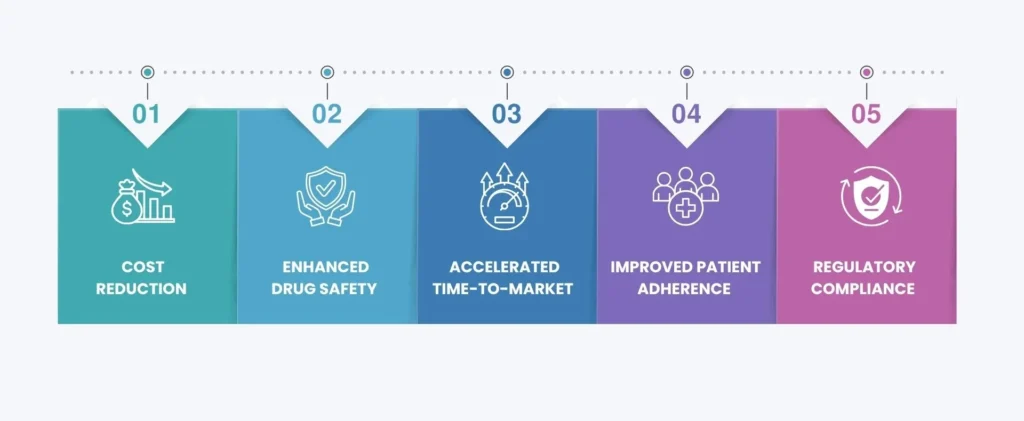You may be surprised to learn that the healthcare industry accounts for 30% of the world’s data volume. With a great set of data, having an optimal analytics operating model is a challenging task. Pharmaceutical companies often struggle to unlock data’s full potential, which leads to slowed performance and growth in the future. Advanced analytics platforms, such as Microsoft Fabric, combined with AI and machine learning, are increasingly helping pharmaceutical companies manage, integrate, and derive actionable insights from these massive datasets, thereby transforming decision-making across the enterprise.
“Digital transformation unlocks breakthrough & innovative business performance
through the synergistic use of technology.” – Andy Lehman
The U.S Pharma industry is adapting enterprise-grade and mid-market software to help commercial functions, including sales forecast, force effectiveness, market access analysis, customer segmentation, and omnichannel marketing. These tools aid in cloud-based, hybrid, and on-premise deployment options by complying with the strict regulations. Furthermore, predictive analytics allows companies to anticipate market trends, optimize inventory, and personalize engagement strategies with healthcare professionals and patients, giving them a significant competitive edge.
The present-day pharmaceutical industry is facing three issues: compounding forces of economic challenges, a tight labor market, and global supply chain issues. Moreover, the prototype design of the new medicines and manufacturing again consumes years, which leads to less ROI. In order to improve the condition, giant pharmaceutical companies are adapting AI, robotic process automation, and big data analytics to harness opportunities in the market and gain a competitive advantage.
Major Benefits of Data Analysis in Pharma

Let’s look at some of the benefits of implementing Data Analytics in the Pharma industry-
Table of Contents
• Cost Reduction
By identifying unnecessary expenses, data analytics also helps in streamlining the process. Predictive analytics can also flag overstocking or redundant lab processes, further optimizing budgets.
• Enhanced Drug Safety
Data Analytics helps detect potential risks early, thereby improving patient safety. The Predictive insights allow companies to implement preventive measures proactively.
• Accelerated Time-to-Market
It facilitates rapid decision-making, shortening the product development lifecycle. This helps the company to enter the market quickly and gain a competitive advantage. AI-driven simulations and real-world evidence analysis further accelerate clinical trial evaluations and regulatory approvals.
• Improved Patient Adherence
With the rise in customized medicines, data analytics helps to understand the patient behaviour and customizes medication strategies. Analytics also enables remote patient monitoring and predictive adherence models, which are essential for personalized care and improved treatment outcomes.
• Regulatory Compliance
Real-time data monitoring supports continuous compliance. Predictive analytics helps companies anticipate regulatory changes and adapt quickly. Automated compliance reporting powered by analytics reduces human error and accelerates audit readiness.
Data Analytics in Smart Pharma Manufacturing
To meet the rising demands of medicines, pharma analytics is integrated into various smart manufacturing solutions.
• Batch processing software
It enables pharma companies to stimulate end-to-end bath processes to fasten the regulatory approval process and production quickly.
• Process optimization software
Assists manufacturers in identifying the areas for improvement. Pharma analytics, when used with process optimization software, accelerates management of resources, enhances quality assurance, and improves customer satisfaction.
• Enterprise asset management software
This asset management solution helps companies to optimize their assets and avoid unplanned downtime to increase production quality. Additionally, by incorporating predictive maintenance analytics to anticipate equipment malfunctions. It also helps pharma companies to oversee the assets for increased efficiency and suggests data-backed solutions.
Integration of IoT sensors in manufacturing plants further feeds real-time operational data into analytics platforms, enabling dynamic optimization and early detection of bottlenecks.
Right from preliminary research and development to delivering products, pharma analytics plays a major role in each phase of the manufacturing process. Multiple companies like Dr Reddy’s are using analytics to stay ahead of the competition. Data lakes are being used across organizations, and insights are being derived by applying data science to the big data. Dr Reddy’s has experienced benefits as the constrained resource in the shop floor has shifted, correlation of a number of mistakes in the lab with the shift of operation, more than x visits per month are not leading to additional brand recall, etc. For example, analyzing lab shift operations helps identify error patterns, optimize workforce allocation, and improve overall productivity.
Precision Medicine
Precision medicine is based on the idea that each patient is different based on their genes, age factor, molecular and lifestyle data, hence providing a specialized medicine would be better than a one-size-fits all approach.
Data analytics has become an integral part of precision medicine by enabling doctors and scientists to extract meaningful insights from vast, complex data sets. The data comprises genomic information, medical images, clinical and lifestyle information, and other factors concerning an individual’s health.
By combining multi-omics data with predictive analytics, pharmaceutical companies can design therapies targeted to specific patient subgroups, improving outcomes and reducing trial-and-error in treatments.
As per the Wiseguy reports, the Commercial Pharmaceutical Analytics Market, which was valued at USD 7.15 billion in 2023, and is expected to grow double USD 15.3 billion by 2032. This shows a growth rate at a CAGR of approximately 8.82% between 2025 and 2032, driven by increasing demand for advanced data-driven solutions in the pharmaceutical sector. Microsoft Fabric is increasingly being adopted due to its integration with Microsoft 365, which also offers the ability to deploy on-prem for compliance.
Organizations leveraging cloud-based analytics can unify fragmented datasets, enable cross-department collaboration, and accelerate insights from R&D to commercialization.
Conclusion
Data Analytics has transformed the pharmaceutical industry into multiple large multidimensional datasets to identify predictors of patient disease activity. The data and information provided by the technologies has revolutionized the pharma sector. Furthermore, drug discovery and development are made possible with the right prediction and by identifying new targets.
But, the applications of Data analytics are not confined to drug discovery and development and span to Pharmacovigilance, i.e, to identify the risks related to the use of a specific drug. To provide valuable insights to the Research and development team, the participation of professionals from different areas is being encouraged, thereby increasing the predictive power of analytics.
Beyond R&D, analytics supports pharmacovigilance by detecting adverse drug reactions early, informs clinical trial design, and enhances patient engagement strategies. Involving professionals from diverse areas increases the predictive power of analytics, improving both operational efficiency and patient outcomes.
At Sparity, we help pharmaceutical companies unlock the full potential of their data. By integrating advanced data analytics, real-time data governance, and cross-functional collaboration, Sparity ensures accurate, actionable insights that drive smarter R&D decisions, enhance pharmacovigilance, and optimize patient outcomes. With our enterprise-grade solutions, pharma organizations can navigate complex datasets confidently, accelerate innovation, and stay ahead in a competitive landscape.
Harness the power of data-driven pharma innovation – Partner with Sparity.















